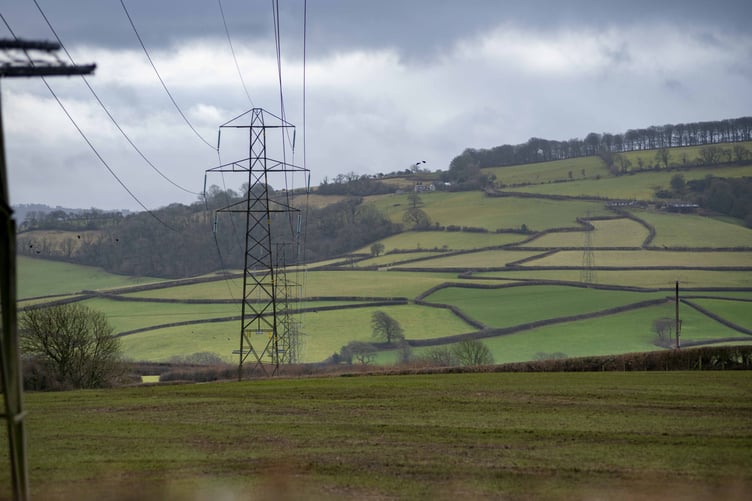POOR misunderstood Green Gen Cymru.
There they are, desperate to pluck Wales out of stuffy old farming and into the thrumming new world of industrial-scale wind-energy, and they get taken to court court.
As many as 300 farmers accuse the energy company of an “unlawful” abuse of power to “force” entry onto private land to carry out surveys for a procession of electricity pylons swinging through 125 miles or more of Carmarthenshire, Ceredigion and Powys, across the Cambrian Mountains and into Shropshire.
According to High Court documents, it’s alleged Green Gen have acted in a “coercive” and careless manner, beyond their powers as an authority able to compulsorily acquire land for public projects. It’s claimed the company have entered land without consent and failed to comply with legally required statutory notices, “without regard for environmental protections or community wellbeing”.
Landowners have said they fear bailiffs and arrest, and feel their homes are being “invaded”.
Green Gen agents are said to have been crossing farm boundaries in dirty clothes, risking the spread of bovine tuberculosis (TB) and sheep scab, while refusing to agree to biosecurity and environmental protocols.
Ah, but who doubts Green Gen have been acting with anything other than the purest of intentions? Primarily that of rewarding themselves with pots of money by way of, amongst other things, amazingly creative PR about how their “green energy pathways” across Wales “will make sure 100% renewable energy can flow to our homes, hospitals, schools, businesses, and communities”.
The only trouble there is that pylons-borne cables are shown on Green Gen’s own maps as merely taking electricity to National Grid collection points in Shropshire and south Wales for onward transmission into England. No sign of anything being syphoned off en route to power up the kettle and toaster at Llareggub village hall. Or devices anywhere else in Wales for that matter.
The company say their would-be distribution network “will tackle the energy crisis, climate crisis, as well as…” - wait for it - “the cost-of-living crisis.” Yes, you’ve got it. Cram the Welsh countryside with pylons and the price of cat-food and cornflakes will come crashing down.
Oh, come on, say trusting souls. Stop quibbling. Do you really think they’d make claims that weren’t transparently true? They must have the people’s best interests at heart. If they hadn’t, they couldn’t pledge to “also empower rural communities through investment, jobs, and skills, enabling communities to live modern electric lives.”
My goodness, how enthralling is that? And, as a pumped-up fantasy of economic egalitarianism, how worthy of challenge. The fact is that Green Gen didn’t foresee its invasive battering-ram would encounter formidable resistance of the kind so artfully wheeled into place by farmers. Such was not anticipated by its PR strategists. They assumed they could persuade people to simply lay back and be lulled by mellifluous hype.
Green Gen could of course change tack and put it about how marvellous it would be if hillsides were plastered with scaled-down versions of the Eiffel Tower. Think Paris, their line could be, think touristic potential; imagine pavement cafés, espressos in French porcelain, louche literary figures, conversations philosophical, latter-day Jean-Paul Sartres…
It could be their way of abandoning, with a sense of fun and good humour, a deeply insensitive plan guaranteed to seriously vandalise long cherished landscapes, a plan that will never, ever, get the public’s stamp of approval.
Bigger Senedd is a waste of money
THE SENEDD should ponder long and hard about its pigheaded determination to blatantly ignore full-blooded public anger over their flagrantly wasteful intention to expand the parliament by more than 50 per cent - from 60 to 96 members - at next May’s elections.
This deeply undemocratic move - shown to be so by repeated expressions of strongly held public opinion - would cost at least £13m next year alone, to be swallowed up by the salaries, support staff and allowances of 36 additional members. The cost of all 96 MSs in the draft budget is estimated at about £34 million.
This object lesson in extravagance is backed by all parties except the Conservatives and points up a perception of SMs inhabiting a cosy and secure Cardiff Bay microcosm remote from the hard-edged world beyond.
The costs of Senedd expansion on this immense scale can, if you like, be set against the Welsh government’s draft budget for next year of £27bn. Yet it’s surely better to see that figure in specific detailed contexts.
For example, school leaders’ union NAHT Cymru points out that local authorities are predicting a £137m budget shortfall for schools in 2026/27, a situation it describes as “unthinkable” when it is known it comes on the back of significant cuts to school budgets, redundancies and scaling back on frontline delivery of education.
The millions earmarked for Senedd expansion would make a small but appreciable difference there.
Then there’s a targeted £58m in “efficiency savings” on rail and bus spending, a sector surely more important than spending on Cardiff empire-building.
Meanwhile, Waunfawr, Gwynedd, has been soldiering on for 10 years with sub-standard facilities at its GP surgery, patients regularly being seen in corridors, portacabins and even in the kitchen. So where does this figure in Senedd priorities? Nowhere is the apparent answer.





Comments
This article has no comments yet. Be the first to leave a comment.